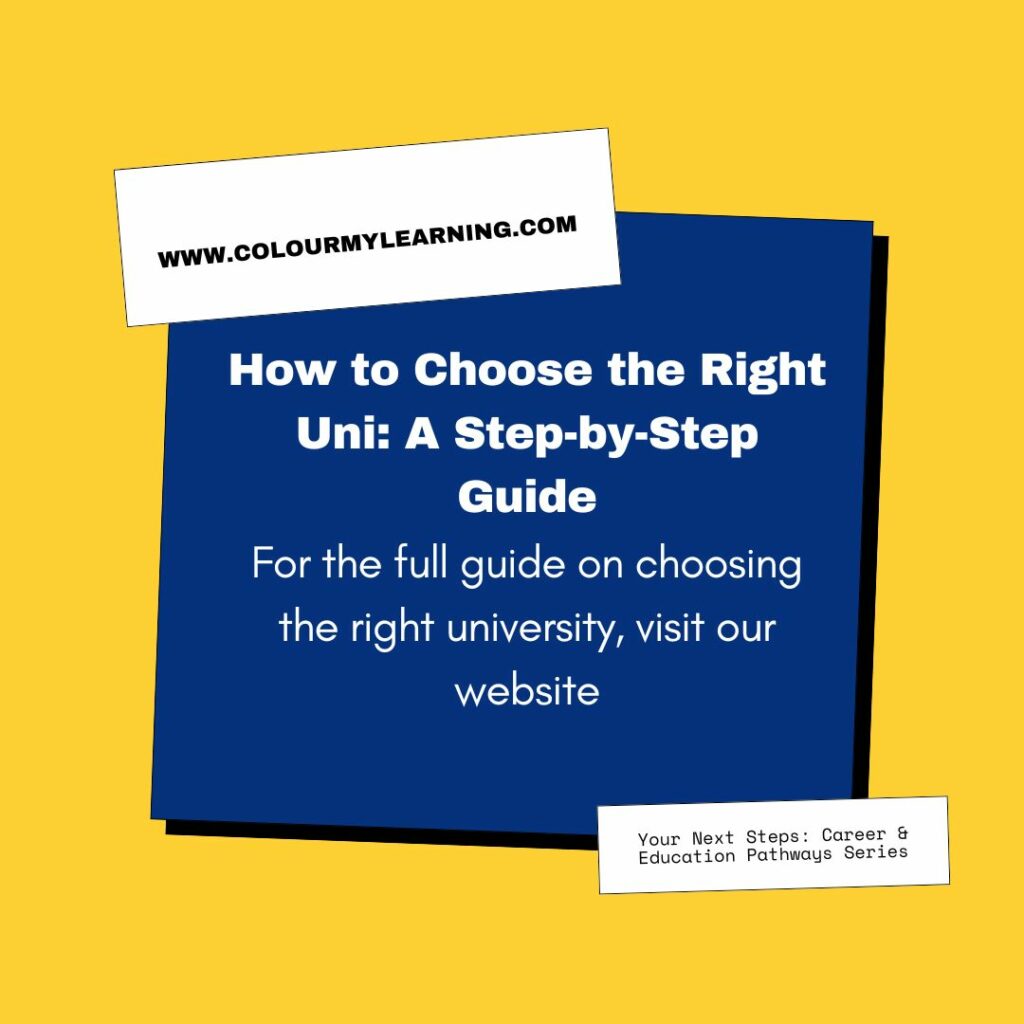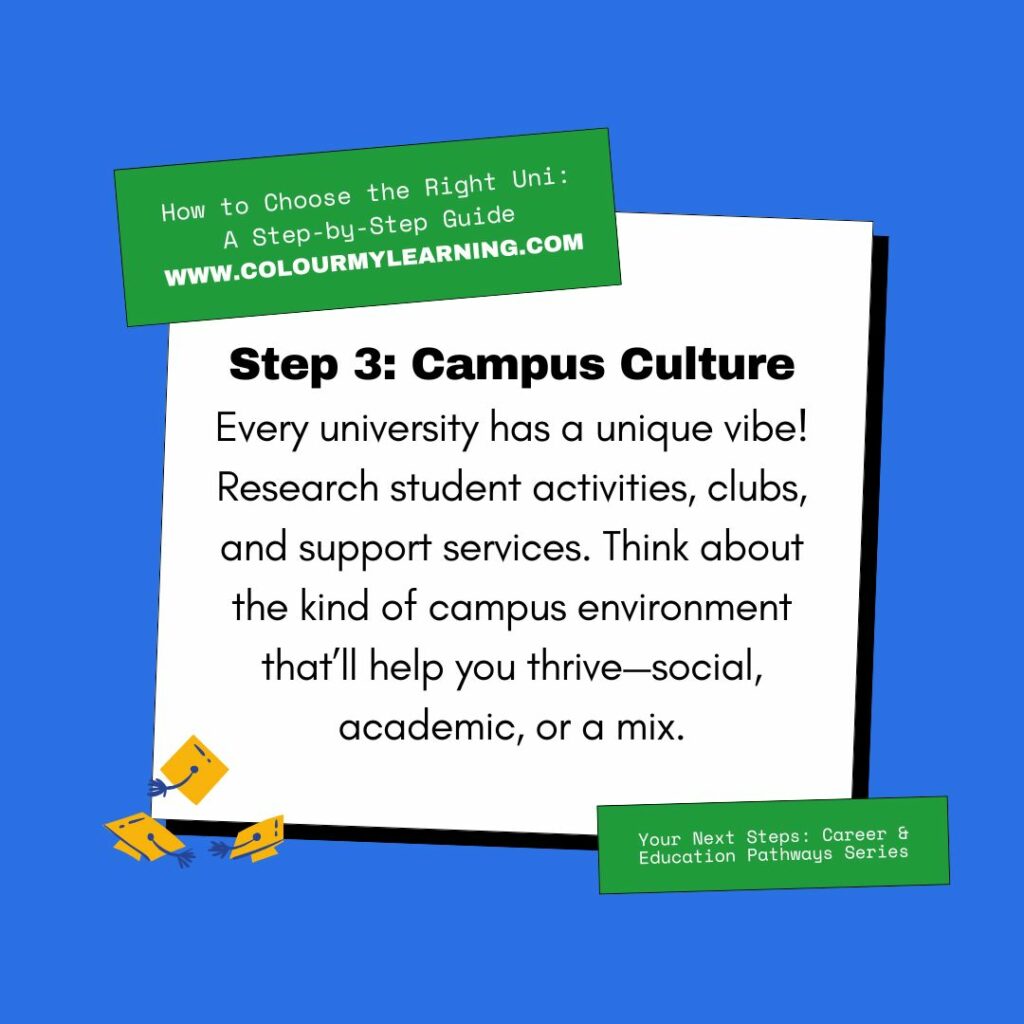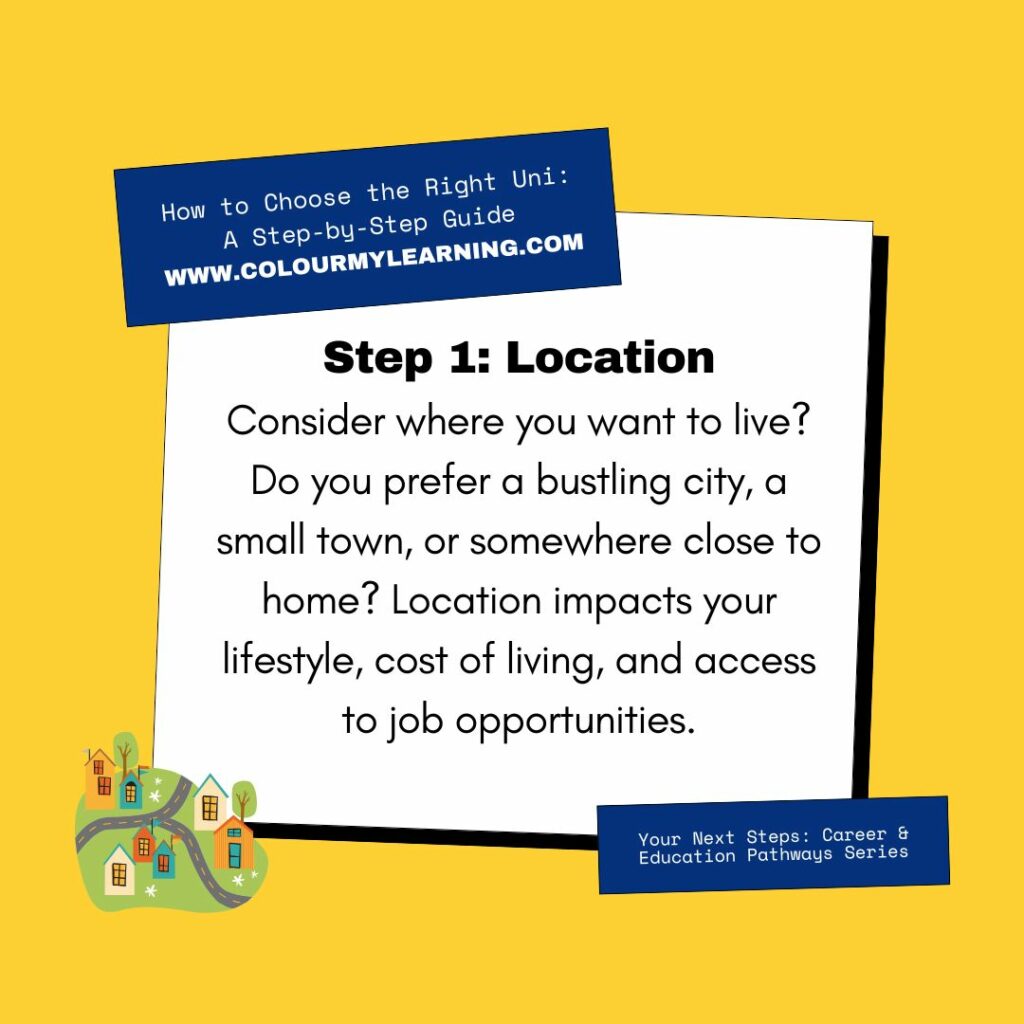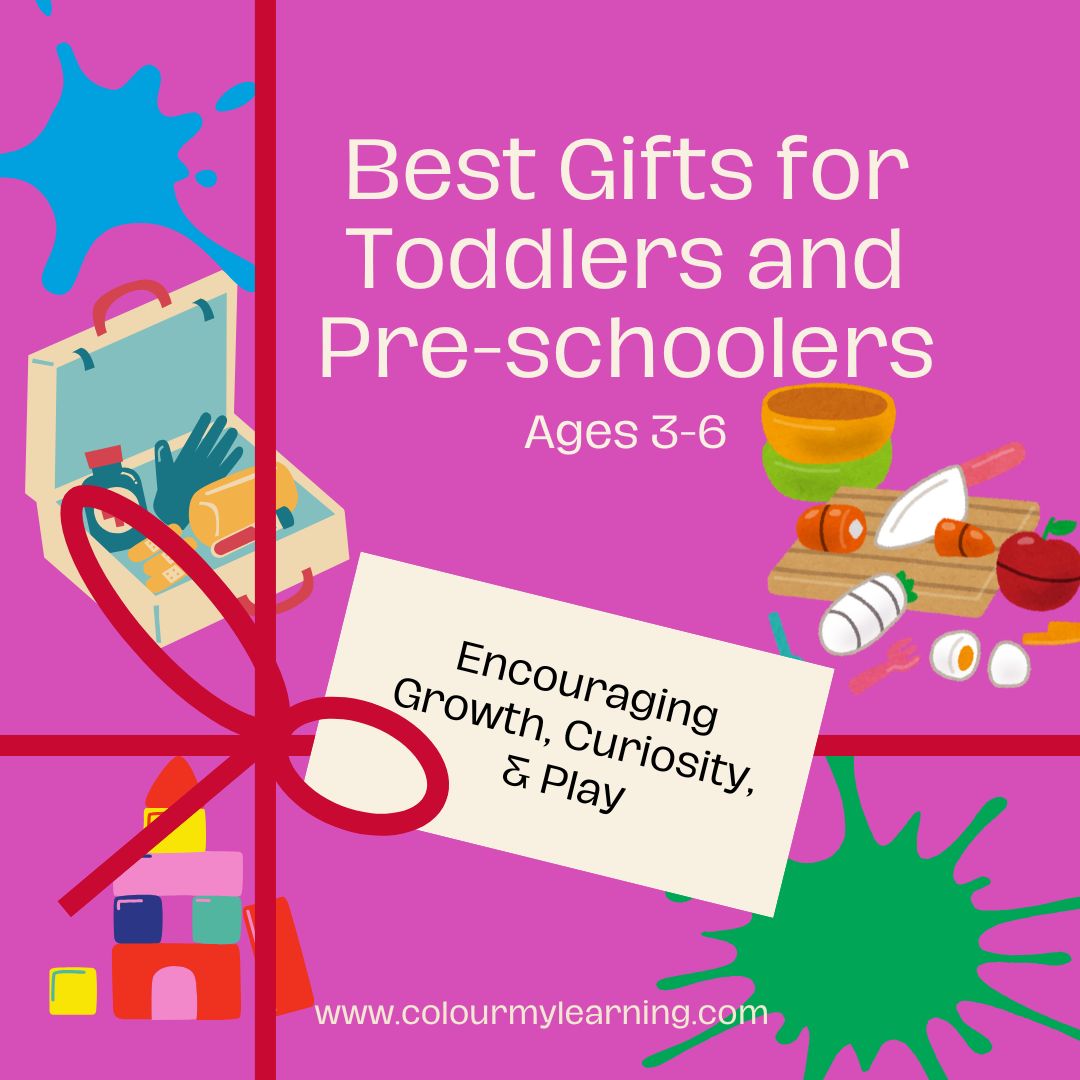How to Choose the Right University: A Step-by-Step Guide
Choosing the right university is one of the most important decisions you’ll make. While it may feel that it’s all about the degree, in reality it is also about finding the place where you’ll live, learn, and grow over the next few years. The university you choose will undoubtedly influence your academic path and your personal development and career opportunities. With so many factors to consider—location, campus culture, accommodation, and career prospects—it’s easy to feel overwhelmed. But don’t worry, this guide is here to break down each step, helping you make a confident, informed choice for your future.
1. Identify Your Priorities
Before you dive into researching Universities, it’s important to think about what really matters to you. Every student is different, and understanding your own preferences will make the decisionmaking process clearer. Are you looking for a university with a strong academic reputation, or do you value campus life and extracurricular activities more? Do you want to be close to home, or are you excited about the idea of moving to a new city or even studying abroad?
Here are some key priorities to consider:
- Academic Reputation: Look at how universities rank for your chosen field of study. A university might not be the top in overall rankings but could be highly regarded in your specific subject area. Consider if research opportunities or industry partnerships are important to you.
- Location: Would you prefer a university in a big city with lots of nightlife and cultural experiences, or a smaller campus in a quieter, more relaxed setting? Think about whether you’d like to stay close to family and friends or if you’re ready to move farther away.
- Support Services: What kind of wellbeing, academic, and career support does the university offer? Knowing you’ll have access to support can make all the difference, especially during challenging times.
- Student Life: Is there a vibrant student community with clubs, societies, and events that match your interests? Universities with diverse extracurricular activities can offer a more wellrounded experience.
Taking the time to list out your top priorities will help you filter through the many universities available and focus on those that align best with your personal and academic goals.

2. Research the Courses
Once you’ve identified your priorities, it’s time to dive into the specifics of the courses each university offers. After all, the course you choose will define much of your academic experience. Start by comparing the course content at different universities. Look closely at the modules offered, the areas of specialisation, and the course structure.
Here are some things to consider:
- Course Content: Does the course offer modules that align with your interests? Universities may offer the same degree title but have very different course content, so it’s important to choose one that excites you.
- Work Placements and Study Abroad: Are there opportunities to gain work experience or study abroad? These can be invaluable for developing practical skills and standing out in the job market after graduation.
- Flexibility: Does the course allow you to switch majors or add a minor if you change your mind? Some universities offer more flexible degree programmes, which can be useful if you’re undecided on your exact path.
- Balance of Theory and Practical Work: If you’re more of a hands-on learner or are interested in a more applied (architecture or quantity surveying) or research-oriented subject (for example pure or natural sciences), check whether the course includes practical work, lab sessions, or industry placements, especially for subjects that. If you prefer theory and research, look for courses with a strong academic and research focus.
Take the time to explore course pages on university websites and read the prospectus. You can often find detailed breakdowns of each module, giving you a better idea of what you’ll be studying over the years.
3. Consider University Rankings
University rankings can be a helpful tool when researching where to study, but they shouldn’t be your only consideration. Rankings give you a general sense of a university’s reputation, but they don’t always tell the full story. It’s especially useful to look at subjectspecific rankings, as a university might be highly regarded in your area of interest, even if it doesn’t rank as highly overall.
When considering rankings, look at:
- Global and National Rankings: These can give you an idea of a university’s general standing and reputation. Universities that rank highly often attract leading academics and researchers, which can benefit your education.
- Subject Specific Rankings: These are arguably more important than overall rankings, as they show how strong a university is in your chosen field. For example, some universities excel in engineering but might not rank as highly for arts and humanities.
- Teaching Quality, Student Satisfaction, and Employability Rates: Look at rankings that assess teaching quality and student experience. These factors can influence your daytoday university life, as they reflect how well the university supports its students and prepares them for life after graduation.
While rankings are a useful part of your research, be sure to balance them with other factors like course content, location, and student life.
Read: University Rankings and Where to Find Them

4. Attend Open Days and Virtual Tours
Attending Open Days is one of the best ways to get a real feel for a university. (Read our Guide on Questions to ask during a University Open Day). Walking around the campus, meeting lecturers, and chatting with current students can give you a sense of what life will be like if you study there. It’s also a chance to explore the facilities, check out the accommodation, and see the surrounding area.
If attending in person isn’t possible, many universities now offer virtual tours that provide a detailed look at the campus. Virtual tours can include 360degree views of key locations like lecture halls, libraries, and student accommodation, as well as videos from staff and students explaining what makes their university special.
When you visit—either in person or virtually—pay attention to:
- Facilities: Are the libraries, labs, and social spaces modern and wellequipped? The quality of the facilities can significantly impact your study experience.
- Accommodation: Is the accommodation comfortable and close to the main campus? Some universities offer tours of student halls during Open Days, giving you the chance to see where you could be living.
- Atmosphere: What’s the vibe on campus? Do the students seem happy and engaged? The atmosphere can give you a sense of whether you’ll feel at home there.
Prepare a list of questions to ask during your visit, such as details about the course, student support services, and extracurricular activities. Gathering this information will help you make a more informed decision.
Also read: Essential Questions to Ask at a University Open Day
5. Evaluate the Location
The location of the university will play a big role in shaping your overall experience. Some students thrive in the excitement of a big city, while others prefer the peace and quiet of a smaller town or rural campus. Think carefully about the type of environment where you’ll feel most comfortable.
When considering location, think about:
- City vs. Campus Universities: Universities in big cities often offer more opportunities for nightlife, cultural events, and work placements. Campus universities, on the other hand, tend to be more selfcontained and may offer a tighterknit student community.
- Cost of Living: Cities like London and Edinburgh can be more expensive to live in, with higher accommodation and transport costs. Smaller towns may offer more affordable living, but there could be fewer parttime job opportunities.
- Transport Links: Consider how easy it is to get home if you plan to visit family often. Also, check how wellconnected the university is to surrounding areas and the wider region.
- Local Culture: What is there to do outside of university life? Look into the local area for things like cafes, shops, theatres, and other recreational activities that align with your interests.
Choosing a location that suits your lifestyle can make your time at university more enjoyable, so make sure to visit the area during an Open Day or virtual tour.
6. Look into Student Life
Student life is a big part of the university experience, and it’s important to find a university where you can enjoy yourself outside of the classroom. Look into what kind of clubs, societies, and social activities are available. Whether you’re into sports, arts, or volunteering, having a range of extracurricular options can make your time at university more fulfilling.
When researching student life, consider:
- Clubs and Societies: Are there societies that match your interests, such as drama clubs, debating societies, or sports teams? Some universities have hundreds of studentrun clubs, which can be a great way to meet people and try new things.
- Student Union and Social Events: The student union often organises events and represents student interests. Check whether the union is active and what kind of events they organise, from freshers’ week to charity fundraisers.
- Support Services: University is a time of transition, so knowing that support is available is crucial. Look into the university’s mental health services, academic support, and career services to see what’s on offer.
Getting involved in student life can enhance your overall experience, helping you make friends, build new skills, and create lasting memories.
7. Consider Accommodation Options
Where you live during your first year at university can have a huge impact on your overall experience. Most universities offer a range of accommodation options for firstyear students, including halls of residence, shared flats, and catered or selfcatered options.
When considering accommodation, think about:
- Types of Accommodation: Does the university offer both catered and selfcatered options? Do you want to live in halls of residence or a shared flat? Some universities also offer quieter halls or halls reserved for mature students.
- Proximity to Campus: How close is the accommodation to your lectures and main facilities like the library or student union? Being within walking distance can make daily life much more convenient.
- Cost: Accommodation costs can vary greatly depending on the type of room and whether you choose catered or selfcatered options. Check what’s included in the rent (utilities, WiFi, etc.) to avoid any surprises.
- Safety and Maintenance: Is the accommodation well-maintained and secure? Make sure to ask about safety measures, such as onsite security or access control.
If possible, visit the accommodation during Open Days to get a sense of what it’s like and whether it feels like a comfortable place to live.

8. Check Career Support and Graduate Outcomes
While university is a time for learning and personal growth, it’s also a stepping stone toward your future career. Investigating a university’s career support services will give you a clearer idea of how they’ll help you make that transition into the working world.
Things to look out for include:
- Internships and Work Placements: Does the university offer opportunities for internships or work placements as part of the course? Gaining practical experience during your studies can boost your employability.
- Career Fairs and Employer Partnerships: Many universities hold career fairs where students can meet potential employers. Check whether the university has partnerships with key companies or industries related to your field of interest.
- Alumni Network: A strong alumni network can help you build professional connections and may open doors for job opportunities after graduation.
- Graduate Employment Rates: Look into the university’s graduate employment statistics. Universities with strong career support often have higher graduate employment rates and can help you secure a job more quickly after graduation.
Knowing that the university has a track record of supporting students’ career development can give you peace of mind about your future prospects.
9. Understand the Financial Implications
Going to university is a significant financial commitment, so it’s important to understand the costs involved and plan accordingly. Start by researching tuition fees and living costs, but don’t forget to factor in additional expenses like books, travel, and social activities.
Here are some financial aspects to consider:
- Tuition Fees: Most universities charge a similar amount for tuition, but international students may face higher fees. Check if there are any additional costs associated with your course, such as lab fees or study materials.
- Living Costs: The cost of living can vary greatly depending on the university’s location. Big cities tend to be more expensive than smaller towns. Create a rough budget to estimate how much you’ll need for rent, food, and other daily expenses.
- Financial Aid and Scholarships: Many universities offer scholarships, bursaries, and grants to help students with financial challenges. It’s worth exploring these options early in the application process to see if you’re eligible.
- Student Loans: If you’re relying on student loans, make sure to understand the repayment terms and how much debt you’ll accumulate over the course of your studies.
By creating a realistic budget and exploring all available financial aid options, you can manage your finances more effectively and avoid unnecessary stress during your studies.

10. Trust Your Gut Feeling
After all your research, campus visits, and conversations with current students, take a moment to reflect. By this point, you’ve likely narrowed down your choices and have a clearer idea of where you can see yourself studying. Trust your instincts when making the final decision. If a university feels like the right fit and matches your academic and personal goals, that’s a good sign. Remember that your application (via UCAS in the UK) allows you to pick up to five choices. It may be impossible to find all five that you absolutely love. It may be that there are only a couple that truly appeal to you. That is sufficient, but do fill in all five choices.
You’ve already done the hard work of gathering information, so now it’s time to decide on the places where you can thrive.
Conclusion
Choosing the right university is a big decision, but by breaking it down into smaller steps and considering what’s important to you, the process becomes much more manageable. Take your time to research, visit campuses, and talk to current students. With the right approach, you’ll find the university that’s the perfect fit for your goals and future. Best of luck on this exciting journey!
Also read our guides on:
Essential Questions to Ask at a University Open Day
University Rankings and Where to Find Them






















